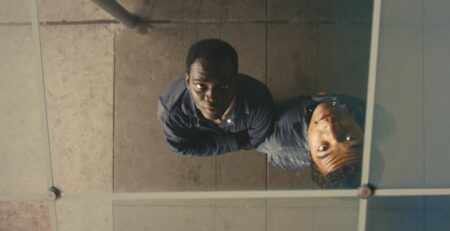
The first World Cup I ever watched was France 1998. Among the many amazing memories I have of said tournament, which introduced me to football as a whole, I fondly remember the Nigerian team, the famous Super Eagles: they were fun, they had flair, and they featured the magic of Jay-Jay Okocha. Little did 6-year-old me knew that I was watching what is now considered one of the greatest African teams of all time giving one of its last hurrahs on the international stage. Yemi Bamiro documents the tale of their rise and greatest triumphs in Super Eagles ‘96, a film that any football fan, old or young, will greatly enjoy.
After a quick rundown of the state of Nigerian football in the ’80s, their poor administrative structure, and the importance of Cameroon’s historic 1990 World Cup run, Bamiro introduces us to Clemens Westerhof, a charismatic Dutch coach who would set the basis for the team’s success by establishing its lively playing style. It was heavily influenced by Brazil while recruiting players such as Jay-Jay Okocha and Daniel Amokachi to execute it. We then go through the 1994 African Cup and their first-ever World Cup participation in 1994.
But sports, and particularly football, are usually tied to politics in some way, and Nigeria in the ’90s was no exception. After a military dictatorship, hope for true social change was squashed after the annulment of the 1993 elections, the imprisonment of beloved leader Kashimawo Olawale Abiola, and a coup d’état headed by Sani Abacha. And just like many political figures who have used football as a sportswashing tool, Abacha turned toward the Super Eagles to consolidate his image. Aided by Nic Zimmermann’s skillful editing, Bamiro explains all of this with superb clarity, thus adding depth to the film. He paints a sharper image of the Nigerian landscape without overshadowing the football side of things.
Super Eagles ‘96 features interviews with many of the team’s key figures—like Jay-Jay Okocha, Dosu Joseph, Emmanuel Amuneke, and coach Jo Bonfrère—as well as journalists and author Noo Saro-Wiwa, daughter of political activist Ken Saro-Wiwa whose death at the hands of Abacha’s regime caused Nigeria’s expulsion from the Commonwealth of Nations. The editing is excellent; the simple yet colorful use of graphics and animation is cleverly used to add dynamism to the documentary. There’s a wealth of footage of AFCON, World Cup, and Olympic Games matches. And, the original score adds just the right amount of emotion during the climactic scenes.
Bamiro effectively uses a hero’s journey narrative of sorts to create a memorable ending. Besides explaining the context and obstacles on the road, he also pays special attention to the team’s crushing defeat at the hands of Roberto Baggio’s Italy in the 1994 World Cup. We see the team fall and feel their pain, thus when we see them rise again in the last part of the film, it’s so much sweeter.
The film makes sure to highlight the importance of the 1996 Olympic Games, the warmth of the local American fans toward the Nigerian team despite the tensions caused by Soro-Wiwa’s execution. Most importantly, it effectively conveys how difficult the opposition was against the star-studded Brazilian team featuring the likes of Bebeto, Ronaldo, and Rivaldo. By doing the latter, the documentary enhances the David versus Goliath narrative, and even though you might know the result of the tournament, you can feel the tension and drama during their epic semifinal encounter. He doesn’t forget the Argentina team either; their final match was marked by racism from the Argentinian fans (oh how things haven’t changed), a subject that the film tackles through interviews with the players (goalkeeper Dosu Joseph is phenomenal here) to help you understand the stakes of the match as well as make you repudiate their opposition. The whole Atlanta 1996 section is brilliant.
Although the political side of things gets lost in the euphoria of its amazing finale, and is cheaply explained by text screens before the credit roll, Super Eagles ’96 captures the spirit of a historic team that brought joy to their nation and to the world, not only through amazing victories but through their style of play and contagious passion. It’s an engrossing and nostalgic documentary that reminds us of both the negative and positive power of football: it can be used as a political tool to manipulate, but also to create joy and union, as well as inspire a whole nation.
Super Eagles ’96 was screened in the Game Face Cinema program at DOC NYC 2022.
Super Eagles '96
-
Rating - 8/108/10
TL;DR
Although the political side of things gets lost in the euphoria of its amazing finale, Super Eagles ’96 captures the spirit of a historic team that brought joy to their nation and to the world.




